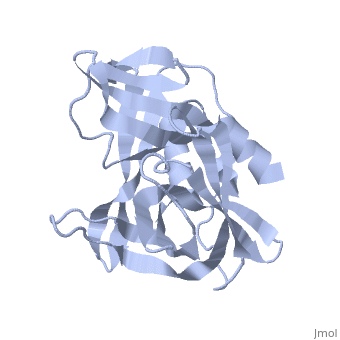2j92: Difference between revisions
New page: left|200px<br /><applet load="2j92" size="350" color="white" frame="true" align="right" spinBox="true" caption="2j92, resolution 2.20Å" /> '''3C PROTEASE FROM TYP... |
No edit summary |
||
| Line 4: | Line 4: | ||
==Overview== | ==Overview== | ||
The 3C protease (3C(pro)) from foot-and-mouth disease virus (FMDV), the | The 3C protease (3C(pro)) from foot-and-mouth disease virus (FMDV), the causative agent of a widespread and economically devastating disease of domestic livestock, is a potential target for antiviral drug design. We have determined the structure of a new crystal form of FMDV 3C(pro), a chymotrypsin-like cysteine protease, which reveals features that are important for catalytic activity. In particular, we show that a surface loop which was disordered in previous structures adopts a beta-ribbon structure that is conformationally similar to equivalent regions on other picornaviral 3C proteases and some serine proteases. This beta-ribbon folds over the peptide binding cleft and clearly contributes to substrate recognition. Replacement of Cys142 at the tip of the beta-ribbon with different amino acids has a significant impact on enzyme activity and shows that higher activity is obtained with more hydrophobic side chains. Comparison of the structure of FMDV 3C(pro) with homologous enzyme-peptide complexes suggests that this correlation arises because the side chain of Cys142 contacts the hydrophobic portions of the P2 and P4 residues in the peptide substrate. Collectively, these findings provide compelling evidence for the role of the beta-ribbon in catalytic activity and provide valuable insights for the design of FMDV 3C(pro) inhibitors. | ||
==About this Structure== | ==About this Structure== | ||
| Line 14: | Line 14: | ||
[[Category: Picornain 3C]] | [[Category: Picornain 3C]] | ||
[[Category: Single protein]] | [[Category: Single protein]] | ||
[[Category: Birtley, J | [[Category: Birtley, J R.]] | ||
[[Category: Curry, S.]] | [[Category: Curry, S.]] | ||
[[Category: Leatherbarrow, R | [[Category: Leatherbarrow, R J.]] | ||
[[Category: Sweeney, T | [[Category: Sweeney, T R.]] | ||
[[Category: chymotrypsin-like cysteine protease]] | [[Category: chymotrypsin-like cysteine protease]] | ||
[[Category: foot-and- mouth disease virus]] | [[Category: foot-and- mouth disease virus]] | ||
| Line 24: | Line 24: | ||
[[Category: thiol protease]] | [[Category: thiol protease]] | ||
''Page seeded by [http://oca.weizmann.ac.il/oca OCA ] on | ''Page seeded by [http://oca.weizmann.ac.il/oca OCA ] on Thu Feb 21 18:00:38 2008'' | ||
Revision as of 19:00, 21 February 2008
|
3C PROTEASE FROM TYPE A10(61) FOOT-AND-MOUTH DISEASE VIRUS-CRYSTAL PACKING MUTANT (K51Q)
OverviewOverview
The 3C protease (3C(pro)) from foot-and-mouth disease virus (FMDV), the causative agent of a widespread and economically devastating disease of domestic livestock, is a potential target for antiviral drug design. We have determined the structure of a new crystal form of FMDV 3C(pro), a chymotrypsin-like cysteine protease, which reveals features that are important for catalytic activity. In particular, we show that a surface loop which was disordered in previous structures adopts a beta-ribbon structure that is conformationally similar to equivalent regions on other picornaviral 3C proteases and some serine proteases. This beta-ribbon folds over the peptide binding cleft and clearly contributes to substrate recognition. Replacement of Cys142 at the tip of the beta-ribbon with different amino acids has a significant impact on enzyme activity and shows that higher activity is obtained with more hydrophobic side chains. Comparison of the structure of FMDV 3C(pro) with homologous enzyme-peptide complexes suggests that this correlation arises because the side chain of Cys142 contacts the hydrophobic portions of the P2 and P4 residues in the peptide substrate. Collectively, these findings provide compelling evidence for the role of the beta-ribbon in catalytic activity and provide valuable insights for the design of FMDV 3C(pro) inhibitors.
About this StructureAbout this Structure
2J92 is a Single protein structure of sequence from Foot-and-mouth disease virus (strain a10-61). Active as Picornain 3C, with EC number 3.4.22.28 Full crystallographic information is available from OCA.
ReferenceReference
Structural and mutagenic analysis of foot-and-mouth disease virus 3C protease reveals the role of the beta-ribbon in proteolysis., Sweeney TR, Roque-Rosell N, Birtley JR, Leatherbarrow RJ, Curry S, J Virol. 2007 Jan;81(1):115-24. Epub 2006 Oct 25. PMID:17065215
Page seeded by OCA on Thu Feb 21 18:00:38 2008
